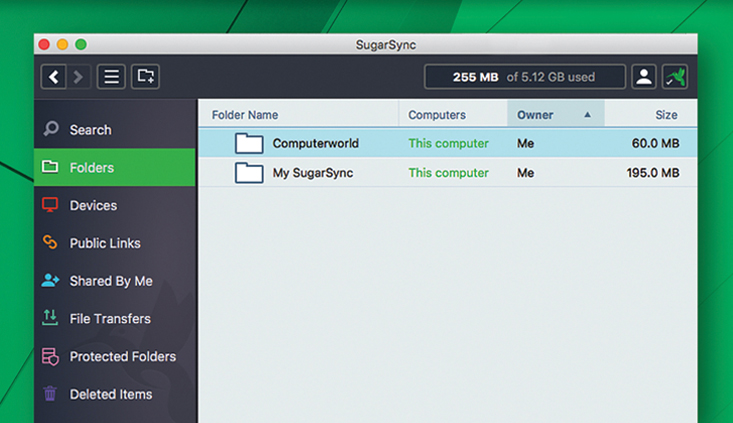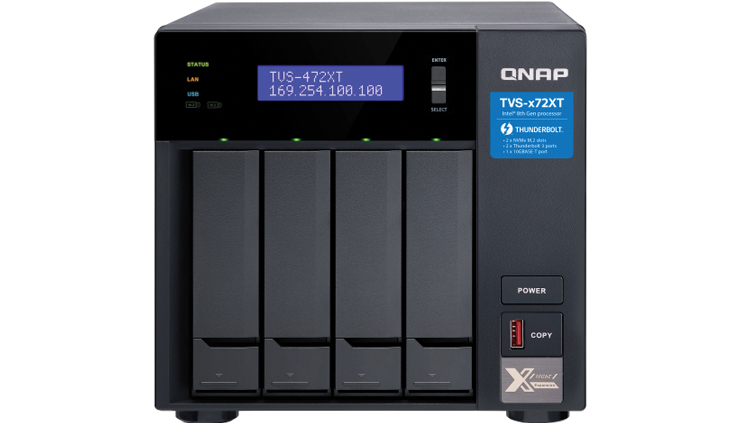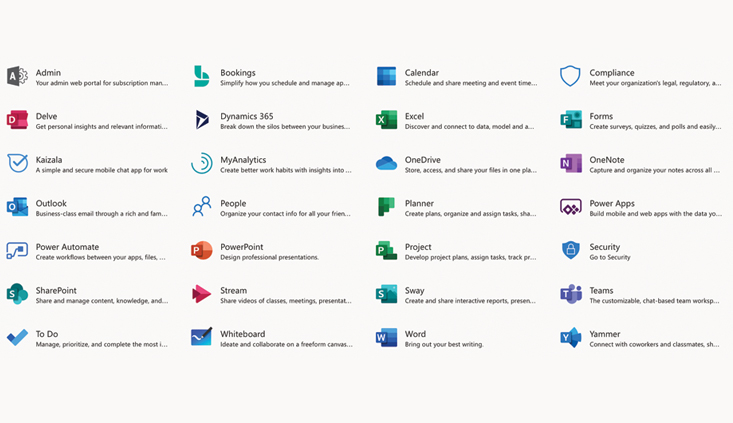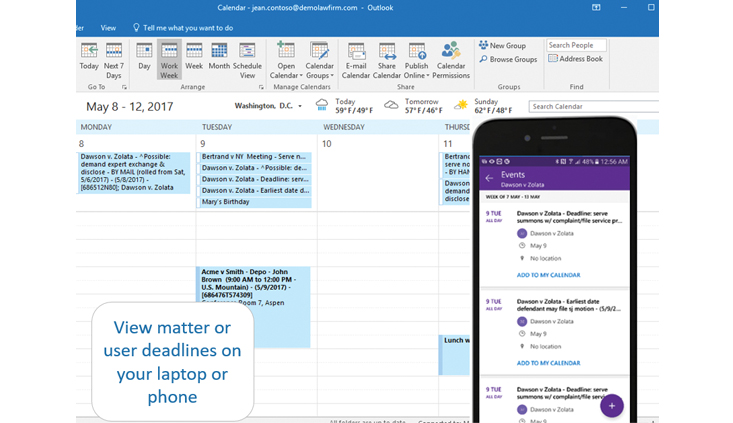Choose the right hardware and software for the remote workplace
Whether you choose to work from home or need to, these tools will make your law firm more productive
At the outset of my career, the managing partner walked down the hall and dropped a thick file on my desk. He was able to keep the file from bursting at the seams by securing it with an oversized rubber band. When I eventually opened the file, pieces of paper flooded out onto my desk. The two-prong fasteners had reached their limit. Nevertheless, it was my job to digest the file and lug it with me to court.
When I began my practice 13 years ago, this was a normal scene. It was more convenient to stuff everything into one file for the purposes of accessibility. There were no PDFs in the server and attorneys rarely corresponded by e-mail. You wrote everything down in a paper calendar and you knew exactly how long it would take for a messenger to get downtown to file your papers. With a clown-size briefcase at your side, you traveled for hours to appear in some remote location for 15 minutes.
It was only a few years later that my partner and I started our law firm. In the ensuing ten years, we witnessed exponential changes in the practice of law due to technological advances. During that time, we adopted and implemented a variety of hardware and software into our practice, which increased our efficiency and helped us work remotely.
While there are many options to choose from for your individual practice, we highly recommend the technology discussed in this article based on our own personal experience with the products. The recommendations are the result of years of trial and error. We hope these products will help streamline your practice at a time when major overhauls are required. When reading these recommendations, please keep in mind that the majority of products are completely compatible with both Apple and Windows-based systems.
Selecting the best server to handle your files
The computer server is the heart of your entire practice. It is the central depository for all your essential data. However, it is more than just a backup location. The server you choose must be able to synchronize your files immediately across each and every device that connects to it. For example, if a coworker wants to update a pleading remotely, you need to be confident that the coworker will be accessing the most up-to-date version of that pleading.
In addition to synchronization, a law firm’s server needs to come packaged with a user-friendly interface for tablets and phones. The quality of the user interface on mobile devices, such as phones and tablets, is crucial for situations where you are in court or where you are working remotely without a computer. The interface allows you to pull up documents on the fly, such as when you need to fact-check the arguments made by opposing counsel during a hearing. It allows you to quickly pull up a document to discuss it with an employee or coworker no matter where you are or what you are doing.
If your firm handles a significant amount of media such as video depositions, the server must also be capable of handling video transcoding. A server with high-quality video transcoding capabilities allows you to view large video files remotely. Unfortunately, there are a number of hardware manufactures or “cloud servers,” which provide inadequate video transcoding in the cloud. Therefore, your firm cannot blindly assume that just any “cloud service” will meet your needs. At a minimum, you need to obtain a cloud service from a reliable third-party provider with the ability to quickly “transcode on the fly.” Preferably, you should purchase your own standalone server and enable cloud services on it through your internet connection, which is much easier to do than you might expect.
Cloud-based servers
In our experience, the two best options for a law firm server are SugarSync for a cloud-based server and QNAP for a standalone server. With regard to SugarSync, it is a third-party cloud-based system. The SugarSync platform keeps all your data on an external server and syncs designated folders from any computer you choose. It is an option when you do not want to own or operate your own standalone server in your office.
SugarSync is very easy to use and gives you access to your files on every device. You begin by taking all your data and organizing it into a set of folders on any computer you own. Once you finish organizing the folders, subfolders, and their files, you download the SugarSync application and use it to designate the main folder you want to sync across all authorized devices.
After those steps are completed, everyone at your firm is able to sync the same folders across their devices. All they need to do is to download the SugarSync application onto any device that needs to access the law firm’s files. As the administrator, you still control access to every folder and subfolder by using the permissions settings to grant access on a per-user basis. In other words, you can grant access to the main sync folder, but then restrict access to a particular subfolder within the main sync folder.
SugarSync is similar to Dropbox in many ways, however it provides certain enhanced features that make it superior as a law firm’s server. SugarSync allows you to sync any folders from any computer and control access to each separate folder you choose to sync. With Dropbox, you must use a specific Dropbox folder as the main repository, which limits the syncing possibilities to those items within the Dropbox folder. Dropbox also provides fewer customization options for controlling access to certain folders and files. SugarSync also offers a plug-in for Microsoft Outlook which adds greater functionality than what Dropbox offers. Most importantly, the ease and efficiency of accessing your files remotely on a mobile device or tablet is far superior to Dropbox or any other cloud providers we have tried. The app is simply fantastic.
The ubiquitous Dropbox
With that said, Dropbox still has its place and is a useful tool to employ in your practice. Dropbox’s ability to quickly generate public links in order to share files makes it useful in a variety of situations. For example, we like to use Dropbox’s public link feature to share our experts’ document production with opposing counsel. However, we personally recommend using Dropbox as an additional tool in your practice, rather than a replacement for SugarSync or a dedicated server. SugarSync has a file-sharing feature as well, but DropBox is so ubiquitous that it makes sense to have both available to your practice.
We elected to use SugarSync in the first few years of our practice because it was a useful and effective platform for remote access. In a court hearing or trial, I regularly used it to quickly access documents and case materials during evidentiary arguments. However, as our practice grew, I discovered a drawback to SugarSync’s platform with respect to syncing large amounts of data across certain computers (drawback not applicable to mobile devices).
Specifically, SugarSync works by creating a full independent copy of all files and folders across the synced non-mobile devices (i.e., office computers, home computers, and laptops). In other words, the files live on each of the computers that have access to those sync folders (this is how the earlier versions of Dropbox worked as well). This becomes a problem for those law firms with large case files, because the size of the sync folders can take up the majority of a laptop’s hard drive space. If the total size of your law firm’s data is less than 250 gigabytes, then this should not pose a problem. However, once your server begins to grow into terabytes of data, it may make sense to transition to a standalone server rather than a third-party cloud service.
Standalone servers
It is very easy to switch to a standalone server and it does not require significant expertise to set up. The products available today are manufactured with the consumer market in mind, rather than only catering to businesses and IT professionals. One such product that a law firm of any size can use is a high-end network attached storage device (NAS).
NAS drives are like a backup hard drive on steroids. They do everything that the cloud servers offer and much more. The products from two particular companies are your best options: QNAP and Synology. Both companies offer excellent products and you should research both when evaluating the right server for your firm. However, we personally recommend a QNAP NAS over Synology for a variety of reasons.
Over the years, QNAP focused on building machines with certain cutting-edge technologies not originally employed by Synology. A perfect example is Thunderbolt 3 QNAP devices. They provide faster file accessibility to Apple computers and many Windows computers, which use Thunderbolt 3 ports.
To put the speeds of Thunderbolt 3 into perspective, if you transferred 20 gigabytes of video depositions to a QNAP server through its Thunderbolt 3 port, the transfer would be completed in less than a minute. If you tried transferring the same video depositions with a traditional USB flash drive, you would be lucky to have the transfer complete within 20 minutes. These speed differences make a major impact if you need to transfer a big set of files from the server onto the laptop for use at trial. Additionally, since QNAP offers a 10GbE converter for Thunderbolt 3, the file transfer speeds to all computers in the physical office location is greatly enhanced as well. These distinctions are important, because speed is crucial when you want to maximize a firm’s productivity.
As for the speeds when accessing files remotely, QNAP offers a feature called “port trunking” (aka LACP – link aggregation control protocol), which provides two crucial features in the remote-work setting: increased bandwidth and load balancing for multiple clients. In other words, LACP allows multiple employees to connect simultaneously to the remote NAS server without noticeably slowing the server down. Additionally, if there are only a few connections at one time, LACP can result in faster speeds for remote connections than you could achieve without link aggregation. It works by combining the speeds of multiple ethernet ports on the back of the NAS server. All you need to do is to connect more than one ethernet port on the NAS to more than one ethernet port on your router. Once the connections are made, you visit the user portal for your NAS and simply enable the link aggregation on those ports. This feature helps significantly when you have multiple users remotely accessing the server at the same time.
QNAP also provides a free cloud service to access your QNAP server if you do not want to set up the QNAP as a standalone server through a static IP. Whether you use their free cloud service to access your unit or you use a static IP, QNAP provides a variety of free software applications to allow you to remotely access your entire server from any computer, phone or tablet. QNAP also provides sync software, which allows you to sync the server files with another QNAP server, Dropbox, Microsoft, or other cloud services.
Do you know where your data is?
A word of caution though with regard to using QNAP’s servers or any third-party servers to make your cloud connection. As a society, we have become very comfortable with using a variety of technologies that are “in the cloud” because of the convenience of the technologies. For example, nobody seems to care what route their data takes when traveling between their computers and Dropbox. People mostly just want it to be readily available. However, you must realize that any time you use a third-party provider to facilitate keeping your data in the cloud, you are allowing your data to be routed through their servers. For that reason, I highly recommend that law offices use a static IP for enhanced security.
For those who do not know, an IP address stands for an “Internet Protocol” address. It is a unique set of numbers that are assigned to your specific internet connection. An IP address acts like a street address of sorts and tells the outside world where to find you on the internet. IP addresses are assigned by your internet service provider (ISP) when you use their service. For example, Spectrum and Frontier are ISPs that will sell you internet service for your home or business. However, when they sell you residential service, they typically will only allow you to have a dynamic IP address rather than a static IP address.
With a dynamic IP address, the ISPs are constantly changing the IP address assigned to you. For example, if you have a dynamic address, then on a Monday you might connect to the internet and have an IP address of 67.151.189.60, whereas on Tuesday the address might change to 98.314.687.22. The constant change is related to the fact that it is more cost effective for an ISP to randomly assign IP addresses to its customers than to reserve a specific set of numbers for a specific person.
In contrast, a static IP address is a permanent fixed address that never changes. ISPs typically only offer static IPs to business customers. If you have a business account for your internet, it typically will not cost much to request a static IP address. For this reason, we recommend obtaining a static IP address, because it guarantees that you can easily find your server directly on the internet at all times without having to use a third-party cloud service. Effectively, it creates a direct line of communication from your computer/device to your server.
With that said, your communications to your server must still travel through a long network of streets in order to reach its destination. For that reason, all QNAP devices come with VPN software included, which provides additional security confidence for those seeking tunneled access to their server. A VPN creates a secure connection between devices such that it is similar to the two devices being on the same private network. It makes sure that no onlookers happen to catch a glimpse of your communications when they are in route to the server and vice versa.
QNAP also increases security by allowing you to automatically block certain IP addresses from connecting to your server. The security settings QNAP provides allows you to set certain criteria that will block anyone who attempts to connect to your server that fit that criteria. A perfect example is a brute-force attack where an attacker attempts to submit many variations of potential passwords for an administrator’s account. If the server allowed unlimited attempts to guess the password, then eventually the brute-force attack would be successful. However, QNAP allows you to specify that certain IP addresses will be banned after a certain number of unsuccessful log-in attempts. But don’t worry, you can always remove an IP address from the ban list if you inadvertently forgot your password and banned yourself.
Another very useful feature is QNAP’s integrated virtualization software. The virtualization software is extremely useful for Apple users who need to use Windows-based, legal forms software. The virtualization software allows you to create a “virtual machine,” which is an independent Windows operating system that is accessible on the NAS. Once set up, the administrator of the NAS installs forms software and other Windows-only software onto the virtual machine. With the virtual machine created in this fashion, an Apple user can remotely connect to the virtual machine through any web browser and use it to print forms that are only available on Windows systems.
Finally, one of the most attractive things about these NAS units is their size. Many models are slightly bigger than a shoebox, which means that a law firm’s server can be kept at any location that has a wireless router.
Despite their small footprint, they still carry significant storage room for your firm data. The NAS units allow you to aggregate the storage capacity of each separate hard drive inserted into the NAS unit by combining them in a RAID setup (RAID is a technology that writes your data to more than one disk drive, in case one should fail). For example, if you bought four 10-terabyte hard drives and used them in RAID 0 setup, your storage capacity would be almost 40 terabytes (i.e., a boatload of space).
Remote access to your office computer
For those solo practitioners who find the prospect of getting cloud service or a standalone server too intimidating, there is a simple alternative to provide you with quick remote access to your work computer.
Let’s say that you maintain a small office and everything you have is on your work computer at the office. You do not want to move the work computer to your home, but you still want to be able to use your home computer to access any files when you need them. A quick and free option is to use software called Jump Desktop (a competitor to the better- known LogMeIn.Com). The software allows you to create a secure and reliable connection to your office computer from your home computer. All you need is to install the software on both computers and create login details. After that, you simply open the Jump Desktop application on your home computer and double click the connection to your work computer. The result will be that your work computer’s desktop will appear before you and you can operate it remotely as though you were sitting in your office in front of that computer. If you like the software and have a few employees you wish to give access to as well, Jump Desktop recently released Jump Desktop for Teams, which is a paid version of their software that allows an entire firm to access their work computers from their home computers.
Although I do not use Jump Desktop for work, I do use it for personal tasks and highly recommend it. It was an easy option to use to help my parents and in-laws when they ran into problems with their computers. With that said, I recommend that you avoid doing the same, because it does not take long before you will be the one whom everyone calls to fix their computer when it runs out of battery.
Calendaring, word processing, and collaboration
As an Apple loyalist since the 1980s, I spent many years avoiding the use of Microsoft products. However, Corel stopped making WordPerfect for Mac twenty years ago and Microsoft Word became the only word processing software that made any sense to use. I still held out against using Microsoft Outlook and Exchange, but inevitably Microsoft’s suite of software (in conjunction with third-party add-ons) became too attractive to avoid when they started the Office 365 subscription program.
The Microsoft Office 365 subscription service (“365”) is the most comprehensive and useful software system for your firm – period. Even if you only subscribe to the standard 365 business plan, the per-user cost is only $12.50 per month, which is an incredible bargain. In exchange for your payment, Microsoft provides you with the following applications: Word (word processing), Outlook (email and calendaring), Excel (spreadsheets), Kaizala (mobile chat for work), Planner (task assignments and progress monitor), PowerPoint (presentations), Teams (customizable chat-based team workspace), Project (project planning and assignments), Delve (insights and monitoring of latest work), OneNote (note creation and syncing), Bookings (organizational appointment management), and so much more. (See graphic)
The Office 365 plan also allows you to have your entire email system hosted through Microsoft with 50GB of storage per mailbox. You still keep your law firm’s domain and all your prior email transfers over.
In other words, the 365 program provides you with the applications you need to collaborate with your employees and coworkers while working remotely. It facilitates quick communication and helps to manage tasks throughout the firm. In addition, when Microsoft introduced third-party “add-ons,” it expanded the technological options available to law firms.
One third-party “add-on” is particularly useful in the calendaring context – LawToolBox. The LawToolBox “add-on” integrates directly into the Microsoft Outlook application. It adds buttons to Outlook, which allows anyone in the firm to enter a new calendar entry that will automatically populate all related dates into the firm’s calendar. For example, when you get a trial date assigned, you enter the trial date into the add-on for the particular case and it will automatically create calendar entries for discovery cut-off, the last day to serve discovery, the last day to file certain motions, and a host of other entries that are dependent on a trial date.
If opposing counsel serves a motion, an employee can enter the hearing date and it will auto-populate the entire calendar with all related opposition and reply brief deadlines. Each employee can then choose whether to add particular entries to their personal calendar from the shared calendar. (See page 24)
Many years ago, I used the popular CompuLaw calendaring software. However, in my experience, the LawToolBox add-on is a superior option and its integration into the Microsoft Office suite of programs is seamless. Due to its ease of use, the popular case-management software provider Clio partnered with the LawToolBox to integrate its functions into their case management software. Regardless of whether you choose to use separate case management software, the combination of the Microsoft 365 plan with the LawToolBox add-on will help improve productivity and efficiency while working remotely, as well as keep the calendar on track while everyone works from different locations.
Software for mailing documents from home
The rise of COVID-19 has increased the frequency with which the service of documents occurs electronically. To a certain extent, I believe this to be a positive change. After all, there really is no need for the legal community to continue printing so many documents when they can be delivered electronically. With any luck, the courts will fully transition as well, and we will no longer have to drag five sets of exhibit binders to every single trial.
With that said, there still remains a need to mail out documents even during the pandemic. This presents difficulty with staff spread across multiple locations and the mail machine stuck at the office with the envelopes and stationery. If you find yourself in need of a temporary solution to allow yourself or your staff to mail out documents from home, then an account and software from Endicia may be the solution.
Endicia operates similarly to Pitney Bowes, Stamps.com or other third-party services. Endicia allows you to print postage directly onto an envelope without the need for stamps. A benefit that Endicia has over other postage companies is that it offers software for both Apple and Windows users. This provides your firm with greater flexibility since you may find that the firm’s staff members have different types of computers at home.
If you create an account with Endicia, every member of your firm can use the software remotely from home to print postage. All that they need is paper in their printer and envelopes. With regard to envelopes, most mailings that are important enough to go out in the mail at this time will likely be a decently thick stack of papers. If that is the case, you are easily able to order Priority Mail Flat-Rate envelopes from USPS.
On their website, the postal service will let you order as many as you need and not charge you for delivering the envelopes to you. Once you and your employees have a stack of the envelopes at home, you have the ability to print priority mail postage onto an ordinary piece of paper and adhere it to the envelopes for mailing. This gives you a great solution in the short term while staff is divided, so long as everyone has a printer and one computer at home.
Other options?
The solutions described in this article are only some of the options available to you. I am not preaching that these are the only solutions for your practice. However, during times like these, many firms do not have the luxury of spending time going through the process of trial and error with new technologies. For that reason, based on our own experience with these products, we highly recommend them if you are searching for solutions to help you transition to operating your firm remotely.
Torsten Bassell

Torsten Bassell is a partner at Lari-Joni & Bassell, LLP. He has tried personal injury and wrongful death cases throughout California, resulting in verdicts featured by The Recorder and The National Law Journal as some of the ‘Top 100 Verdicts’ in California and the nation. He is a past finalist for CAALA’s Rising Star Award, CAALA’s Trial Lawyer of the Year Award and CAOC’s Street Fighter of the Year Award.
Copyright ©
2026
by the author.
For reprint permission, contact the publisher: Advocate Magazine




